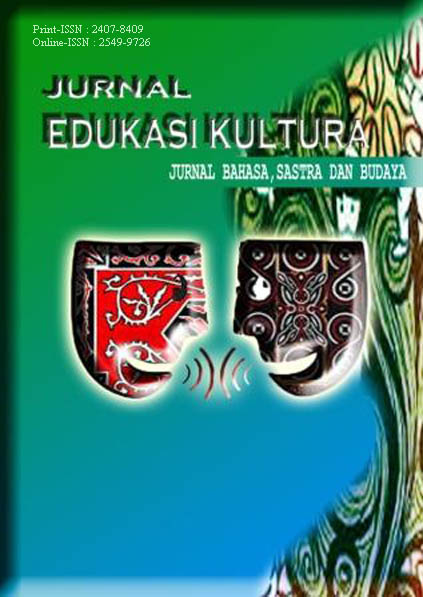Tantangan dalam mengimplementasikan Pembelajaran Berbasis Proyek dalam Pengajaran Matematika di Kelas VI A SD Negeri 101771 Tembung
DOI:
https://doi.org/10.24114/edukasikultura.v12i1.66199Abstract
This study aims to identify and analyze the challenges faced in implementing Project-Based Learning (PjBL) in teaching mathematics in Class VI A of SD Negeri 101771 Tembung. The research method used is descriptive qualitative with data collection techniques in the form of observation, interviews, and documentation. The results of the study indicate that the implementation of PjBL faces several main challenges, including limited teacher understanding of the PjBL concept, lack of resources and teaching aids that support project-based learning, and limited learning time. In addition, students' ability to work independently and in groups is also an obstacle, considering that most students are still accustomed to conventional learning methods. Lack of support from parents in helping children complete projects at home also affects the effectiveness of the implementation of this method. However, PjBL has great potential in increasing student involvement and understanding of mathematics material if implemented optimally. Therefore, further training is needed for teachers, as well as cooperation between schools and parents to support the success of project-based learning at the elementary school level.References
Herdianto, M. Z., Sanjaya, J. H. L., Yuliafarhah, N., Azzahra, N., & Wahyono, S. P. (2024). Problematika Penerapan Pembelajaran Matematika Berbasis Proyek. Diskusi Panel Nasional Pendidikan Matematika, 10.
Larmer, J., & Mergendoller, J. R. (2015). Gold Standard PBL: Essential Project Design Elements. Buck Institute for Education.
Mulyasa, E. (2018). Manajemen dan Implementasi Kurikulum 2013. Bandung: Remaja Rosdakarya.
Romdona, S., Junista, S. S., & Gunawan, A. (2025). TEKNIK PENGUMPULAN DATA: OBSERVASI, WAWANCARA DAN KUESIONER. JISOSEPOL: Jurnal Ilmu Sosial Ekonomi dan Politik, 3(1), 39-47.
Sari, A. S. P., Amalia, A. R., & Sutisnawati, A. (2022). Upaya Meningkatkan Keaktifan Belajar Siswa dalam Pembelajaran Matematika Menggunakan Media Rainbow Board di Sekolah Dasar. Jurnal Cendekia: Jurnal Pendidikan Matematika, 6(03), 3251-3265.
Siroj, R. A., Afgani, W., Fatimah, F., Septaria, D., & Salsabila, G. Z. (2024). Metode penelitian kuantitatif pendekatan ilmiah untuk analisis data. Jurnal Review Pendidikan dan Pengajaran (JRPP), 7(3), 11279-11289.
Sugiyanto. (2021). Implementasi PJBL dalam Kurikulum Merdeka. Jakarta: Dirjen GTK.
Wardhani, A. I., Rukayah, R., & Kurniawan, S. B. (2023). Analisis kesulitan guru dalam mengimplementasikan model pembelajaran project based learning (PjBl) pada kurikulum Merdeka Materi Membangun Masyarakat Yang beradab. Jurnal Pendidikan Dasar, 11(2), 141-148.
Zuhera, Y., Habibah, S. H., & Mislinawati, M. (2017). KENDALA GURU DALAM MEMBERIKAN PENILAIAN TERHADAP SIKAP SISWA DALAM PROSESPEMBELAJARAN BERDASARKAN KURIKULUM 2013 DI SD NEGERI 14 BANDA ACEHKENDALA GURU DALAM MEMBERIKAN PENILAIAN TERHADAP SIKAP SISWA DALAM PROSESPEMBELAJARAN BERDASARKAN KURIKULUM 2013 DI SD NEGERI 14 BANDA ACEH. Elementary Education Research, 2(2).
Published
How to Cite
Issue
Section
License
Copyright (c) 2025 Madeline Samaeri Harefa, Elvi Mailani, Amelisa Siahaan, Devi Ruth Chayana Saragih

This work is licensed under a Creative Commons Attribution 4.0 International License.

This work is licensed under a Creative Commons Attribution 4.0 International License
Authors who publish with this journal agree to the following terms:
- Authors retain copyright and grant the journal right of first publication with the work simultaneously licensed under Creative Commons Attribution 4.0 International License that allows others to share the work with an acknowledgement of the work's authorship and initial publication in this journal.
- Authors are able to enter into separate, additional contractual arrangements for the non-exclusive distribution of the journal's published version of the work (e.g., post it to an institutional repository or publish it in a book), with an acknowledgement of its initial publication in this journal.Penulis.
- Authors are permitted and encouraged to post their work online (e.g., in institutional repositories or on their website) prior to and during the submission process, as it can lead to productive exchanges, as well as earlier and greater citation of published work (Refer to The Effect of Open Access).



